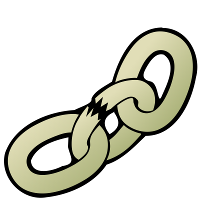|
Cyno's Role-Play: Supplements: PowerQuest: Game Master Guide |
Other Damages and Death
Damage Resulting from Falls
In the event of a serious fall, causing measurable damage, the Damage Potential may be calculated by rolling 1d6 once for every 20' fallen.
Damage Area Specification Roll
Many Game Masters prefer to simply ignore, or choose themselves, where one character's successful attack hits on an opponent. However, if it is so desired, a Damage Area Specification Roll may be used to determine where on an attacked character, injury occurs. Roll 1d20, and refer to the following table.
Rolled Number Damage Area
1 Right Hand
2 Left Hand
3 Right Arm
4 Left Arm
5 Right Foot
6 Left Foot
7 Right Leg
8 Left Leg
9 Heart
10 Head
11 Chest
12 Stomach
13 Hip
14 Right Eye
15 Left Eye
16 Right Ear
17 Left Ear
18 Mouth
19 Nose
20 Back
Damage to the head results in disorientation (Reduce Agility by 50%) for one Round. Damage to other body parts may take them out of action until healed, at the GM's discretion depending on the amount of damage, and natural/artificial armouring present. A strike to the head or heart doubles the damage potential of a hit.
Damage to Inanimate Objects

Weapons, destructive Power Wielding forces, and other such attacks may be made upon not only lifeforms, but inanimate objects and substances as well, such as in the case of breaking down a door, or smashing a stone. In such cases, an HP (Health Point) value must be assigned to the material being attacked. Due to the wide variety of mundane and magical materials possible, the Game Master must decide on this value depending on what the situation is, but in general, glass is approximately 3 HP per cubic foot of material, wood 6 HP per cubic foot, sonte 12 HP per cubic foot, metal 24 HP per cubic foot, and liquids an average of 1 HP per cubic foot. This means that to utterly destroy a block of metal occupying a volume of 10 cubic feet, a total of 240 HP Damage Potential is required; to freeze a three cubic foot block of ice from the water in a lake, would expend 1 PP for a Wielder, etc. This gives a good, flexible system for dealing with inanimate material damage.
Bleeding
A character, once heavily injured, may continue to bleed and lose Health Points, until healed or bandaged. If this is the case, average bleeding rate is 1d6 in damage every ten minutes.
Mental Shock
In the event of a traumatic occurrance, or extraordinary events beyond the character's experience, the Game Master may wish to perform a mental Adaptability roll related to a character involved. This is a Task Determination Dice Roll, for mentally withstanding the psychological trauma, with Adaptability and Will (ADP and WIL) being the Positive Modifiers. If success occurs, the character withstands the shock. If it fails, unconsciousness for 1d6 hours results, followed by extreme behaviour and emotional disruption based on the occurrance.
Physical Shock
In some cases, a severe shock to the system such as being struck by lightning, or falling from a great height, may in itself cause damage to a lifeform. A Task Determination Dice Roll is performed in such cases as warranted, with Positive Modifiers being Constitution and Will (CON and WIL). If success occurs, shock causes no damage. If it fails, CHP instantaneously drops to 10% of MHP, resulting in unconsciousness.
Unconsciousness and Death
When a character's CHP is equal to, or less than 15% of its MHP, it is unconscious. If CHP drops to 0, the character dies. When a character dies, the spirit may choose to observe events surrounding its body and friends, or may travel as desired in the astral plane overlapping the physical world, observing it, or it may travel to the higher realms; the spirit world. If it is so desired, a player may choose a Task Determination Roll to become a ghost, or optionally, undead.
Positive Modifiers include WIL, INT, and the Talent of Power Wielding. Negative Modifier is equal to -1 per hour that has passed since death, before the attempt is made.
Upon becoming a ghost or undead entity, the character regains full CHP, and has all Traits and Talents formerly associated with it. Ghosts and undead are 'normal' character types, and therefore are subject to damage according to their nature, as any other character is. For example, a ghost, due to its incorporeal nature, may be harmed by destructive supernatural energy resulting from a Power Wielding, but may not be harmed by a sword; an undead character may be harmed by either magical or mundane means. If a ghost or undead is killed, that is not the absolute end. Additional attempts to revive may be made, at a -10 negative modifier per time 'killed' as ghost or undead.
